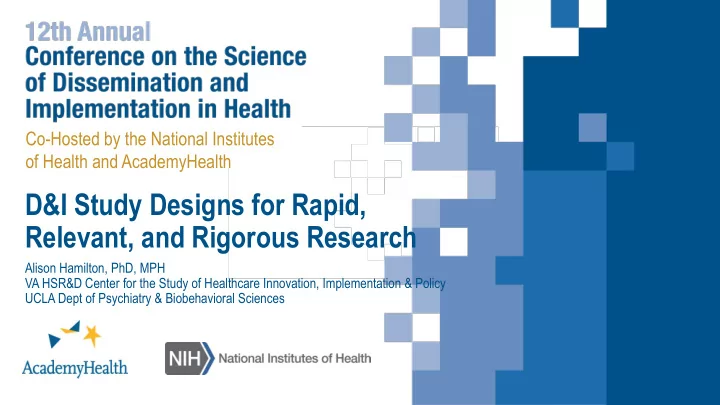

1 Co-Hosted by the National Institutes of Health and AcademyHealth D&I Study Designs for Rapid, Relevant, and Rigorous Research Alison Hamilton, PhD, MPH VA HSR&D Center for the Study of Healthcare Innovation, Implementation & Policy UCLA Dept of Psychiatry & Biobehavioral Sciences
2
An epistemological ledge 3 Qualitative scholars need to “stand out on an epistemological ledge and aggressively move qualitative thinking into the mainstream of health care scholarship.” (Hoff 2011)
Qualitative thinking in the implementation science 4 “mainstream” PubMed: qualitative & implementation 1999-2009: 1704 2009-2020: 12819
Tensions in the qualitative D&I mainstream 5 • Managing & reflecting time and temporality (Reynolds & Lewis 2019) • Inquiring about power • “Our traditional expertise with context and meaning must be supplemented with questions of power to understand what holds these contexts and meanings in place.” (Agar 1997) • Understanding (organizational) culture as constructed and intersubjective (Agar 1997) —not “found” or coherent (or entirely measurable) • Being pragmatic, rapid, rigorous AND “complexity - informed,” tuned into "the unknown, the uncertain, the unpredictable and the emergent" (Greenhalgh & Papoutsi 2018)
Ethnography can help! 6 Identify “rich points” (Agar 1997) • Surprises, problems in understanding resulting from “strips of experience” • Points at which your assumptions are revealed to be inadequate • The rich point is YOUR problem to figure out Incorporate an “ethnographic sensibility” ( Pader 2006) • How we are in, look at, and move through research settings Reflect regularly on implementation processes (Finley et al., 2018) • What’s happening from the insider’s viewpoint, sensemaking
Complexity theory needs ethnography 7 1997: “I think complexity theory…will add potential understanding and explanation that linear cause and effect models cannot approach.” (Agar 1997) 2019: “If we are serious about understanding the ‘black box’ of complexities, then we need to take social science seriously.” (Goodwin 2019)
8 “If people have cooperative intentions, and if the collaboration begins right at the beginning, adding ethnography to a project is like adding yeast to bread dough or beer. Once you see what it does, you can’t imagine why anyone would do it any other way.” (Agar 1997)
Get comfortable out here 9 Keep looking at/for different viewpoints Don’t worry that you can’t see or know everything Move from the rich points to deeper understanding
Acknowledgements 10 • Supported by VA QUERI (QUE 15-272, QIS 19-318), VA HSR&D (SDR 10-012, IIR 18-116), NHLBI (U01HL142109) • Special thanks to Drs. Erin Finley and Sarah Ono for inspiring me. Works Cited Agar MH. Ethnography: an overview. Subst Use Misuse. 1997 Jul;32(9):1155-73. Finley EP, Huynh AK, Farmer MM, Bean-Mayberry B, Moin T, Oishi SM, Moreau JL, Dyer KE, Lanham HJ, Leykum L, Hamilton AB. Periodic reflections: a method of guided discussions for documenting implementation phenomena. BMC medical research methodology. 2018 Dec;18(1):153. Goodwin N. Improving Integrated Care: Can Implementation Science Unlock the 'Black Box' of Complexities? Int J Integr Care. 2019 Jul 25;19(3):12. Greenhalgh T, Papoutsi C. Studying complexity in health services research: desperately seeking an overdue paradigm shift. BMC Med. 2018 Jun 20;16(1):95. Hamilton AB, Finley EP. Qualitative methods in implementation research: An introduction. Psychiatry research. 2019 Oct 1;280:112516. Hamilton AB, Mittman BS, Campbell D, Hutchinson C, Liu H, Moss NJ, Wyatt GE. Understanding the impact of external context on community-based implementation of an evidence-based HIV risk reduction intervention. BMC health services research. 2018 Dec;18(1):11. Hoff TJ. Toward a culture of qualitative thinking in health services research. Med Care Res Rev. 2011 Feb;68(1):49-55. Pader E. Seeing with an ethnographic sensibility. Interpretation and method: Empirical research methods and the interpretive turn. 2006:161-75. Reynolds J, Lewis S. Ethnography and evaluation: temporalities of complex systems and methodological complexity. Anthropol Med. 2019 Apr;26(1):1- 17.
11 THANK YOU! • Alison Hamilton, PhD, MPH • VA Greater Los Angeles & UCLA @alisonh3
Recommend
More recommend